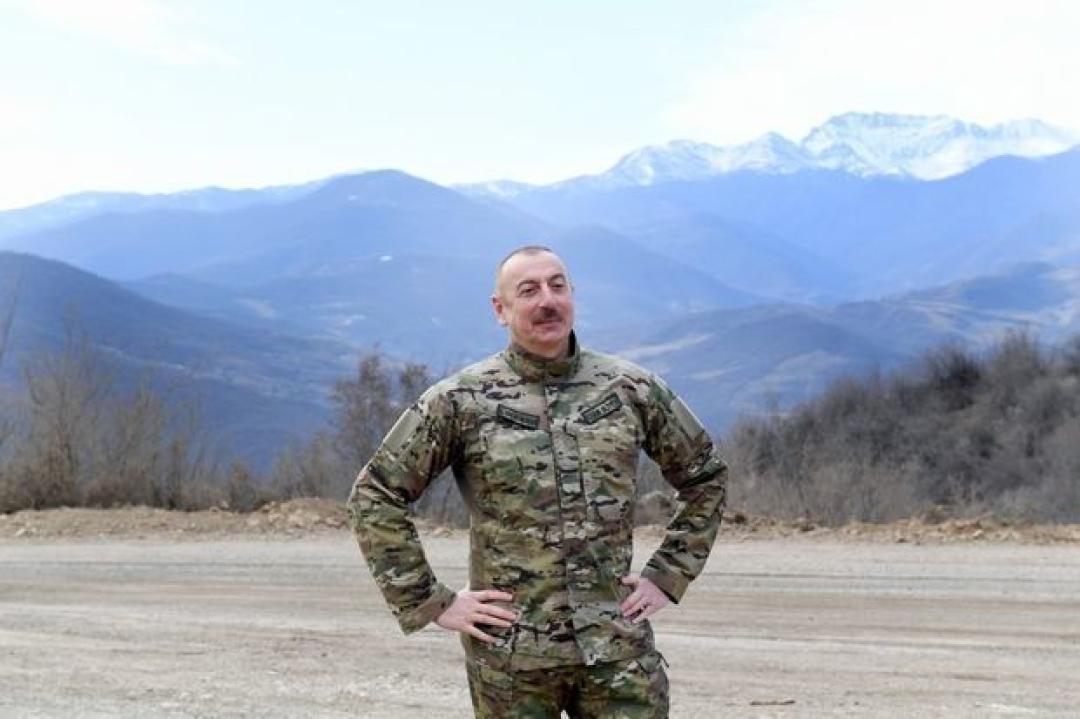
Ilham Aliyev on April Battles, Peace Agreement, and Zangazur Corridor

On September 21, Ilham Aliyev, the President of Azerbaijan, raised the Azerbaijani flag in the city of Lachin, the Press Office of the Azerbaijani President reported.
"No one gave these lands to us; no one returned these lands to us through negotiations. International organizations, including the UN, its Security Council, and the OSCE, should have forced the occupying state to vacate these lands. Sanctions should have been imposed against Armenia. None of this happened. On the contrary, to perpetuate this occupation, Armenia, Armenians of the world, and their patrons wanted to join forces and realize their sordid intentions. I have always been saying that the people of Azerbaijan will never agree with this. I have always been saying that if the issue cannot be resolved peacefully, we will resolve it militarily, and we did exactly that," he said.
"After the April battles [in 2016], Armenia was frightened and was ready to withdraw its troops from the occupied lands. It even promised to do so. However, it did not keep its word afterward. The April battles were not a lesson for them. Two years later, the “Gunnut” operation was carried out in Nakhchivan, and strategic heights were taken under control. This did not teach them a lesson either. Finally, the Second Karabakh War culminated in a complete defeat of the Armenian army, as the victorious Azerbaijani Army liberated our native lands. We thought this would teach them a lesson because the Armenian army was in a destroyed state. A country with 10,000 deserters is not capable of waging war – neither physically nor morally," the President stated.
"We have proposed five principles for signing a peace treaty with Armenia. In words, they accepted them, but we do not see it in practice. Again, this is a stalling tactic. According to the act of capitulation signed by Armenia on November 10, 2020, the Armenian armed forces should have withdrawn from Karabakh. They haven't been fully withdrawn yet. Armenia was supposed to provide a corridor to ensure a connection between the main part of Azerbaijan and the Nakhchivan Autonomous Republic. So far, not only have they failed to provide the corridor, but the corridor's route has not been communicated to us. No concrete work has been done. We have now built the railway to Zangilan. We built the highway to Zangilan. At the end of next year, we will bring the railway and the highway to the border with Armenia. However, nothing is being done across Armenia, and it seems they are unwilling to do anything. They are still delaying time," Aliyev highlighted.
"As a result, when another provocation was committed against us on September 13, the Azerbaijani army responded and put the enemy back in place. I do hope that this will finally teach them a lesson. Because they saw that no one and nothing could stop us, No one's call, no statements or initiatives can stop us. We are on our land, and we are protecting our land. Our positions along the border allow us the opportunity to anticipate any Armenian provocation and take necessary measures. We are in favorable positions on the Azerbaijan-Armenia border from Mount Murov to the Araz River. These positions give us a military advantage and the possibility of visual control over a vast area, including control over essential communication lines. We are already based in these areas. We didn’t have access to these borders for 30 years," the President stated.
According to him, Azerbaijan regained control over its borders after the Second Karabakh War ended. "If Armenia wants to accuse us of entering their territory, there is no basis for that. First, if the border was where they said it was, they should have established the border, built border lines, established communications, and carried out engineering work. They were under the impression that all of Karabakh and Zangazur would remain theirs, which is why they did not do anything on the Azerbaijan-Armenia border. In other words, in the absence of border delimitation, no one can claim where the border passes. Let me reiterate that we are ready for discussions and approach the work of delimitation commissions, the Azerbaijan-Armenia commissions, with great responsibility. We have collected all the maps. I want to say again that we have all the maps, including those from the 19th century, the 20th century, and even earlier, and those maps clearly show who is sitting on which land. Therefore, no one can accuse us in the absence of delimitation," he concluded.
See Also


Armenia Records 5.9% GDP Growth in 2024, Missing 7% Goal

Yerevan Balances Strategic Ties with Both US and Russia, Says Foreign Minister

FM Mirzoyan: Peace Deal with Azerbaijan Is Within Reach

Pashinyan and Erdogan Hold Call, Reaffirm Commitment to Ongoing Dialogue

